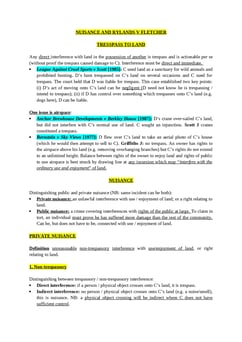Corr v IBC Vehicles Ltd [2008] UKHL 13
Judgement for the case Corr v IBC Vehicles Ltd
Table Of Contents
KEY POINTS
Negligence is legally defined as the failure to exercise reasonable care resulting in harm. Causation establishes a direct link between negligent acts and resulting harm, crucial in legal proceedings. Employer admission of negligence indicates responsibility, influencing liability outcomes.
Employer negligence can impact employees' mental health, leading to legal claims if a safe work environment is not provided. In cases of employee suicide linked to employer negligence, legal liability arises. Establishing a connection between employer actions and tragic outcomes is crucial for accountability.
Foreseeability of suicide assesses if a reasonable person could anticipate employer actions leading to such consequences, determining liability extent. Contributory negligence evaluates the employee's contribution to harm, potentially mitigating employer liability.
The Fatal Accidents Act 1976 in the UK outlines compensation for wrongful death. It enables dependents to seek damages if death results from wrongful acts, neglect, or default, providing a legal avenue for addressing the consequences of fatal negligence.
FACTS
In 1996, Thomas Corr (‘Claimant's husband’), employed as a maintenance engineer by the IBC Vehicles Ltd (‘Defendant’) sustained severe head injuries due to malfunctioning machinery.
After extensive reconstructive surgery, he developed post-traumatic stress disorder, leading to depression. Formerly a happily married man with an even temperament, he was admitted to the hospital in February 2002 after a drug overdose. By March, he was deemed at significant risk of suicide. In May, he was diagnosed with severe anxiety and depression, culminating in his suicide by jumping from a multi-storey car park three days later.
Mrs. Eileen Corr (‘Claimant’), acting as the widow and administratrix of the deceased's estate, initiated legal proceedings against the Defendant.
While admitting negligence and breach of statutory duty for the accident, the Defendant denied liability under section 1(1) of the Fatal Accidents Act 1976 concerning the deceased's suicide. Additionally, the Defendant pleaded contributory negligence under section 5 of the Act.
The judge granted £85,000 in damages for the widow's claim on behalf of the deceased's estate but dismissed the Fatal Accidents Act claim. The judge ruled that the Defendant's duty of care did not extend to preventing suicide, deeming it not reasonably foreseeable. No finding was made regarding contributory negligence.
On appeal by the Defendant, the Court of Appeal overturned the judge's dismissal of the claim under the Fatal Accidents Act 1976, allowing the Claimant's appeal.
JUDGEMENT
In dismissing the appeal, the court held that the employer had a duty to exercise reasonable care, including preventing psychiatric injury to the employee. Foreseeability of physical injury risk was enough to establish liability. The deceased's depressive illness was deemed a direct and foreseeable consequence of the accident caused by the Defendant.
Despite the suicide being a deliberate act, it was considered a direct result of the depressive illness, with the deceased's impaired capacity for reasoned judgments. The chain of causal consequences for which the Defendant was liable was not broken by the suicide, treated as a novus actus interveniens.
Regarding contributory negligence, the court noted that reducing damages would be inappropriate without satisfactory material to determine if and by what amount such a reduction should be made.
COMMENTARY
In this case, a maintenance engineer sustained severe head injuries in 1996 due to machinery malfunction, leading to post-traumatic stress disorder and depression, culminating in suicide. Legal proceedings by the widow against the Defendant involved an admission of negligence but denial of liability for suicide and an allegation of contributory negligence. The initial judgment granted damages but dismissed the Fatal Accidents Act claim, stating the duty of care didn't extend to preventing suicide.
The Court of Appeal overturned the dismissal, holding the employer had a duty to prevent psychiatric injury. Foreseeability of physical injury risk established liability, considering the deceased's depressive illness a direct consequence of the accident. The court rejected the idea that suicide broke the causal chain. Emphasising insufficient material, it noted the evolving legal perspectives on employer responsibility for mental health and suicide.
ORIGINAL ANALYSIS
Defendant was employed by Plaintiff who negligently allowed an accident to occur whereby Defendant was struck on the head and suffered depression and ultimately committed suicide as a result.
HL allowed her clam, stating that Plaintiff’s suicide was a “direct and foreseeable consequence” of the act of negligence, despite being a conscious decision.
Lord Bingham
There can be no recovery for damage which was not reasonably foreseeable.
For Further Study on Corr v IBC Vehicles Ltd
Need instant answers? Our AI exam tutor is here to help.
Ask questions 🙋 Get answers 📔 It's simple 👁️👄👁️
Our AI is educated by the highest scoring students across all subjects and schools. Join hundreds of your peers today.
Get StartedSimilar Cases
Related Product Samples
These product samples contain the same concepts we cover in this case.
| Tort Law | Negligence Psychiatric Injuries Notes (5 pages) |

